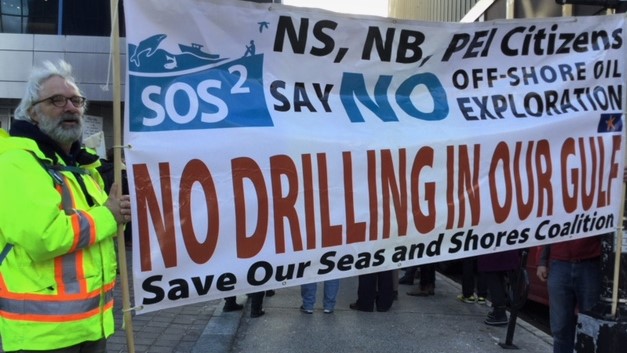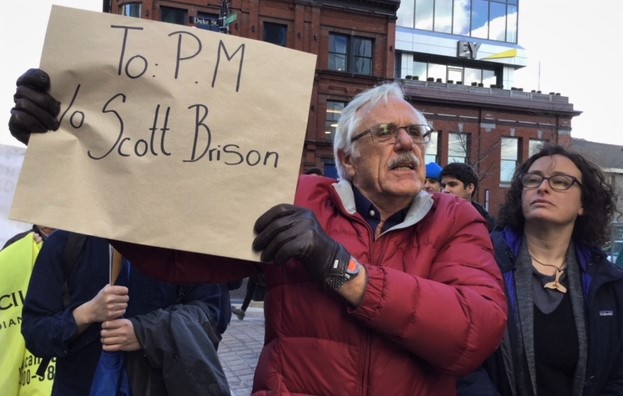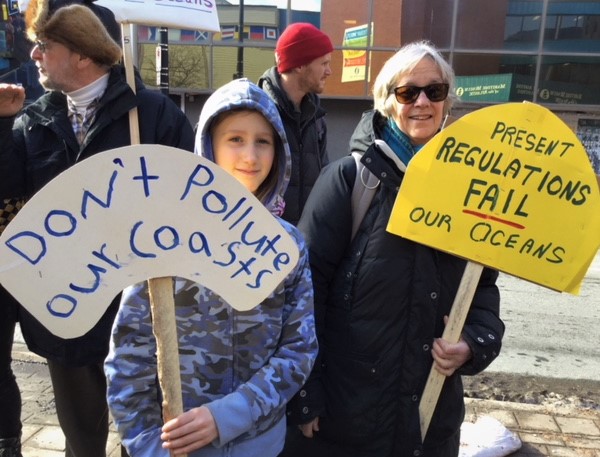Environment
Offshore Alliance wants industry players to stay away from offshore assessments
Environment groups warn against possible consequences for Atlantic Canada

caption
Members of the Offshore Alliance protest irresponsible drilling practices in Nova Scotia waters
caption
Members of the Offshore Alliance protest irresponsible drilling practices in Nova Scotia waters.Chants of “water is life” and “water is more precious than oil” echoed from the Maritime Museum of the Atlantic to Hollis Street on Wednesday when over 40 people marched to protest potential changes to offshore assessment regulations.
Protesters waved homemade signs and banners, shouted, and sang. One person pulled along a noise machine, which played recordings of seismic testing, a method used to test the ocean floor for areas rich in oil or gas.
The group’s goal was to deliver a letter to Nova Scotia MP Scott Brison. The letter is endorsed by over 20 environmental groups. It outlines the coalition’s fears that the federal government may allow the quality of offshore assessments to be compromised. Related stories
The group want Brison to deliver the letter to Prime Minister Justin Trudeau. Brison was not present for the protest, but the letter was received by one of his staff.

caption
Protesters outside 1801 Hollis St. chant “Scott Brison, treasure our oceans!”Gretchen Fitzgerald, the national program director of Sierra Club Canada Foundation, said at a pre-protest news conference that their main concern is about the quality of environment assessments done by “industry captured regulatory boards.”
She said that term refers to board members who are considered too closely tied to the oil and gas industry to be trusted with environmental assessments.
“Their mandate is to promote oil and gas development in our offshore areas, so they have a conflict of interest,” she said.

caption
Gretchen Fitzgerald watches John Davis, director of the Clean Ocean Action Commitee, hold up the coalition’s letter.The coalition is worried the federal government plans to break promises made during the 2015 election campaign to make environmental assessments credible.
A federal discussion paper, released last June, suggests the government may be doing just that. According to the paper, the government is considering allowing assessments to be conducted jointly with industry regulators, like provincial offshore petroleum boards.
Colin Sproul, director of the Bay of Fundy Fisherman’s Association, said in an interview before the protest that board members have no business doing environmental assessments.
“They don’t have the expertise or the trust of the public to perform that duty,” he said.
Sproul explained that it will only takes one mistake to forever affect Nova Scotia’s economy.
“One deep water blowout on the Scotian shelf would have disastrous consequences and it would be felt for generations,” he said.

caption
Nine-year-old Salis Webb (left) protests because he doesn’t want bad oil drilling to happen in Nova Scotia.The Canada Nova Scotia Off-Shore Petroleum Board members are not elected by the public. According to the C-NSOPB website, five out of six board members have previous experience working for companies in the oil and gas industry, and only one board member has experience in the environmental field.
A spokesperson for C-NSOPB said they were unable to comment on the subject of environment assessments, and suggested any questions, with respect to federal legislation and potential changes, be directed to the federal government.
Sproul said his association recognizes the economic value of oil and gas projects in the province. However, anything that endangers the fishery industry in its long-term sustainability endangers the sustainability of the coastal communities in Nova Scotia.
“We’re not asking to be obstructionists; we’re just asking for a fair and credible environmental assessment process,” he said.

caption
Protesters circle the entrance to 1801 Hollis St. as John Davis delivers the coalition’s letter.Fitzgerald shares these concerns.
She said proper environmental assessments are also crucial to ensuring the protection of marine ecosystems and the species that live in them.
“For instance, the fate of the right whale hangs by a thread,” she said.
Fitzgerald said she hopes the protest will impact the federal legislation process. The legislation is expected to be drafted in the coming weeks.


D
Dr Marian Walsh
A
Angel Moore
C
Colette Girard